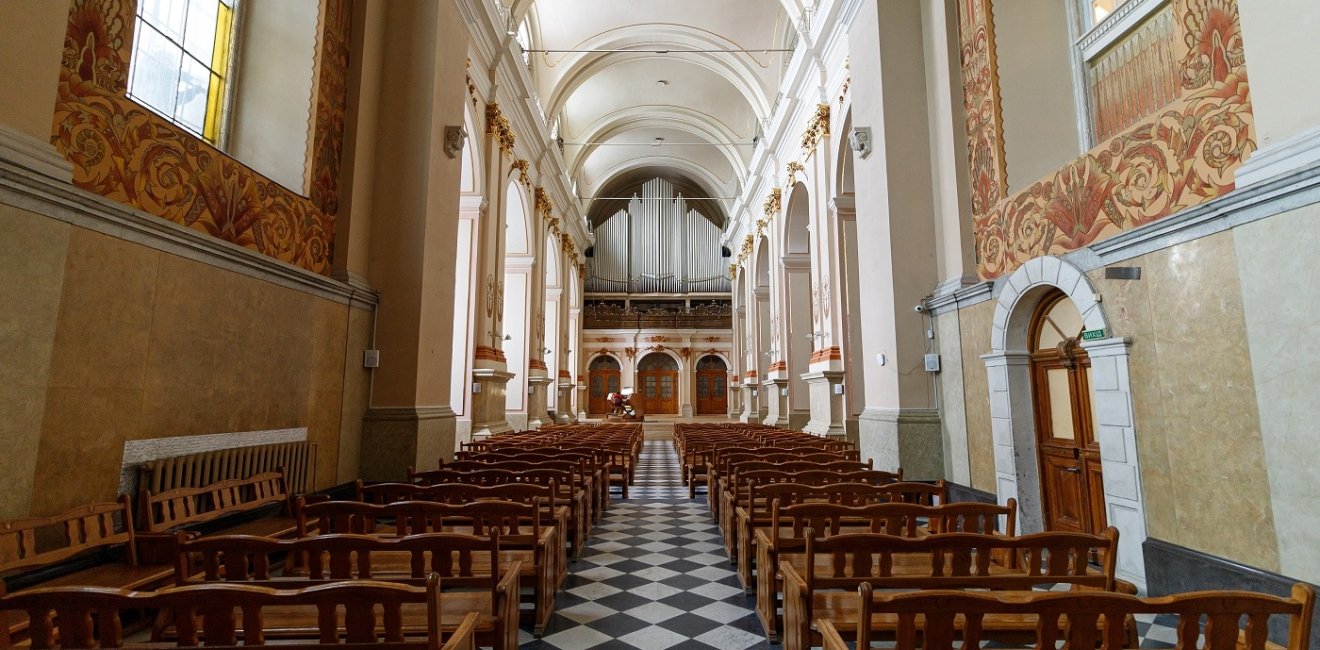
A blog of the Kennan Institute
The recording session at the Lviv Organ Hall was hardly mezzo-soprano Zoryana Kushpler’s first rodeo. A regular with the Vienna State Opera and the Vienna Volksoper, Kushpler already had nine recordings under her belt, ranging from a collection of Spanish songs (canciones) and full-length recordings of operas to motion picture soundtracks and a compilation of Slavonic songs recorded with her twin sister Olena accompanying her on piano. This time, she was joined by the Academic Symphony Orchestra of the Luhansk Regional Philharmonic and Ukraine’s leading sound operator Andryi Mokrytskyi to set down an album of Ukrainian opera arias.
Ukrainian opera, like so much Ukrainian cultural achievement, has languished under other labels, such as Habsburgian, Russian, and Soviet. Playing hide-and-seek with better known cultural movements, casual listeners might be excused from concluding that there is no such thing as Ukrainian opera, even before you add a heavy dose of malice and Putin’s claim that Ukrainian culture does not exist.
Americans should understand this phenomenon. When Antonín Dvorák served as director during the 1890s of the short-lived National Conservatory in New York, he advocated for an embrace of African American music into the mainstream musical canon. This opinion led the “dean” of American music critics at the time, Bostonian Philip Hale, to launch into a tirade that was no less racist for being polite. Dvorák, however, stuck to his guns and included African American tunes in his Ninth “New World” Symphony. He oversaw the admission of 150 African American students at the conservatory, including future noteworthy musicians William Marion Cook, Maurice Arnold Strathotte, and Harry Burleigh. More than a century and a quarter passed before the Black Lives Matter movement of 2020 prompted leading American orchestras to add compelling works by neglected African American and women composers to their repertoires.
Ukraine’s classical music community, from Odesa to Lviv, Kyiv to Kharkiv, and many cities in between, has been at the forefront of wartime efforts to reclaim its rightful Ukrainian heritage. As noted in a previous blog, the community collaborated to launch the Ukrainian Live Classic app, compiling more than 1,500 pieces and more than 2,500 scores by more than 100 Ukrainian composers across four centuries. This response to Putin’s spiteful claim is to demonstrate that Ukrainian culture in the classical music world has been hiding in plain sight all along.
Kushpler’s new recording pulls together arias in Ukrainian that she has already performed in Vienna and elsewhere. A native of Lviv, she comes from a leading musical family. She started studying piano with her mother at age five, before moving to violin. As a teenager, she began attending her father Ihor Kushpler’s class at Lviv’s University of Music. Within a few years, she sang Rosina in Rossini’s Il Barbiere de Sevilla and Maddalena in Verdi’s Rigoletto in productions at the Lviv Opera House. Her twin Olena, meanwhile, continued at the piano, becoming a noteworthy performer. The sisters have collaborated on performances and recordings.
Kushpler extended her operatic training in Hamburg and Munich, eventually landing regular performances in Vienna. There, she has become a mainstay in her important role of Ulrica in Verdi’s Ballo in Maschera and as the lead in Bizet’s Carmen. She has sung across Europe and North America, including performances of Gustav Mahler’s Third Symphony with the Cleveland Orchestra and Beethoven’s Ninth Symphony at New York’s Carnegie Hall. She also teaches at Salzburg’s Universität Mozarteum.
Musicians from the Luhansk Regional Philharmonic joined in this effort, under the baton of Ivan Ostapovych, backed Kushpler during the recording session this August. This orchestra had grown unsteadily during the postwar period before establishing itself as a center for propagating the classical repertoire in the most eastern of Ukraine’s provinces. For many years, the orchestra was known for its community outreach programs through schools and factories, bringing many Soviet-era virtuosi to the area, including David Oistrakh and Emil Gilis. With Ukrainian independence, the ensemble toured worldwide, under the direction of Austrian conductor Kurt Schmid. The orchestra retreated to Severodonetsk following the initial Russian incursion into the region in 2014, establishing a smaller Academic Symphonic Orchestra with its director Ihor Shapovalov. That group evacuated to Lviv following the extension of Russian occupation in 2022.
In a 2015 interview with the Austrian newspaper Kurier, Kushpler mused about her success as a female artist. “I fundamentally believe,” she said, “that women can do everything! With a lot of love and energy, everything is possible. No woman should miss out on this happiness because of fear for her career.” Perhaps she would add now, “for fear of war.”
The opinions expressed in this article are those solely of the author and do not reflect the views of the Kennan Institute
Author

Former Wilson Center Vice President for Programs (2014-2017); Director of the Comparative Urban Studies Program/Urban Sustainability Laboratory (1992-2017); Director of the Kennan Institute for Advanced Russian Studies (1989-2012) and Director of the Program on Global Sustainability and Resilience (2012-2014)

Kennan Institute
After more than 50 years as a vital part of the Wilson Center legacy, the Kennan Institute has become an independent think tank. You can find the current website for the Kennan Institute at kennaninstitute.org. Please look for future announcements about partnership activities between the Wilson Center and the Kennan Institute at Wilson Center Press Room. The Wilson Center is proud of its historic connection to the Kennan Institute and looks forward to supporting its activities as an independent center of knowledge. The Kennan Institute is committed to improving American understanding of Russia, Ukraine, Central Asia, the South Caucasus, and the surrounding region through research and exchange. Read more

Explore More in Focus Ukraine
Browse Focus Ukraine
Talking to the Dead to Heal the Living

Ukrainian Issue in Polish Elections


